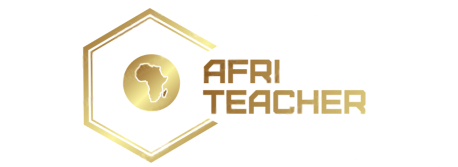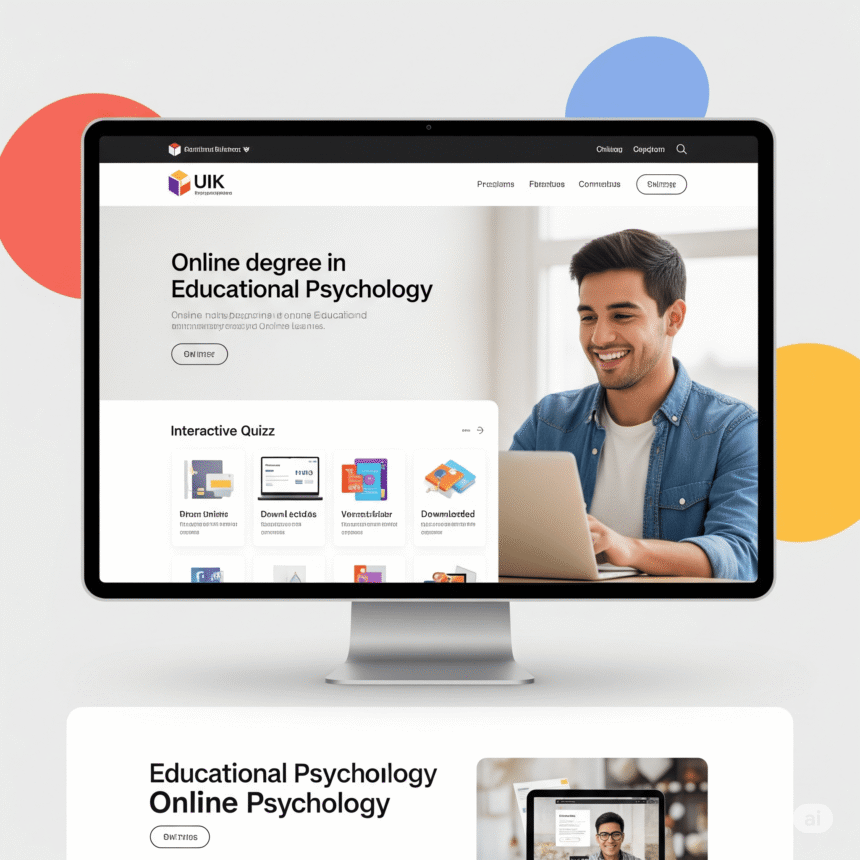A profound understanding of how we learn has never been more important in the constantly changing world of education and human development. An online degree in educational psychology is a life-changing key that can open up a world of opportunities for you, whether you’re a seasoned teacher who wants to make a bigger difference, a business professional who wants to make training and development more effective, or an aspiring psychologist who is fascinated by the complexities of the human mind.
This in-depth guide, crafted by a top blog writer, shows you the many career paths, real-world benefits, and life-changing uses of obtaining an online degree in this exciting field. We’ll talk about what it means to be an educational psychologist in the 21st century, look at how flexible and accessible online learning is, and give you practical, science-based advice on how to improve your learning and daily life.
The Dawn of a New Educational Era: Why an Online Degree in Educational Psychology is More Relevant Than Ever
The digital revolution has changed the way we work, connect, and learn. This shift in perspective has elevated the field of educational psychology to the forefront of innovative concepts. Educational psychology is no longer just for schools and colleges. It is now the basis for effective corporate training programs, easy-to-use educational technology, and meaningful social interventions.
Getting an online degree in educational psychology is the first step toward this exciting new field. It gives you the freedom to get a rigorous, in-depth education from anywhere in the world, on your time. This accessibility makes it possible for people from all walks of life, including working professionals, parents, and people from different backgrounds, to start a rewarding career without having to change their lives.
But the appeal goes beyond just being easy to use. Reputable online programs, like the University of Southern California’s M.Ed. in Learning Design and Technology and Purdue University’s Online Master of Science in Education in Educational Psychology, offer a curriculum that is both very theoretical and very practical. You will look into important areas like
- Cognitive and Developmental Psychology: Learning about the complicated ways the brain learns and grows from birth to adulthood.
- Learning Theories: Explore the fundamental concepts of behaviorism, cognitivism, and constructivism and their application in various learning environments.
- Motivation and Engagement: Finding out what makes people love learning and stay engaged over time.
- Assessment and Evaluation: Learning how to use the right tools and methods to find out how well a program works and what students learn.
- Research Methods and Statistics: Learning the important skills needed to look at data, understand research, and help make educational psychology more evidence-based.
A World of Job Options: What You Can Do with Your Online Degree in Educational Psychology
There are many different jobs that graduates with an online degree in educational psychology can do, just like there are many different ways that people think. Here are some of the most promising and important career paths:
The Traditional Trailblazers: Making the Future of Education
Psychologist at School: As a K–12 school employee, you will be a valuable resource for students, teachers, and parents. Your days will be full of giving tests to find out if students have learning disabilities or are gifted, making and carrying out individualized education programs (IEPs), counseling pupils, and working with teachers to make learning environments that are better for everyone. The National Association of School Psychologists (NASP) is a wonderful place for people who want to become school psychologists to get information.
Designer of Curriculum/Instruction: You will be responsible for designing learning experiences in this role. You will use what you know about cognitive science and learning theories to make intriguing and useful lesson plans for schools, colleges, and educational companies. You could make anything from a new reading program for kindergarteners to a college-level chemistry course that students can take online.
Educational Researcher: If you love learning new things, a career in educational research lets you help build the field’s basic knowledge. You could work for a university, the U.S. Department of Education’s Institute of Education Sciences, or a private research group. Your studies will shape the functioning and management of schools for years to come.
The Corporate Innovators: Changing the Way We Work

Corporate Trainer and Learning and Development Specialist: In the fast-paced world of business, it’s important to keep learning all the time. As a corporate trainer with a background in educational psychology, you will be uniquely qualified to create and deliver training programs that are not only useful but also truly life-changing. You’ll use ideas from adult learning theory to make workshops, e-learning modules, and leadership development programs that are engaging and help employees do better at their jobs, which will help the company grow. This intriguing article on careers in corporate training elucidates that a typical day for a corporate trainer involves a blend of teaching, coaching, and strategic planning.
User Experience (UX) Designer/Researcher: The ideas behind user experience shape all of the digital products we use every day, like educational apps and productivity softengagingan help make digital experiences that are simple to use, fun, and useful because you know a lot about cognitive psychology and how people interact with computers. You will study users’ tech habits and use that data to create useful, user-friendly products. Explore the connection between psychology and UX design by reading this insightful blog post on the psychology of UX.
As an organizational development consultant, you’ll use psychological principles to help organizations become more effective by boosting employee motivation, teamwork, and leadership. You might be asked to create and implement performance management systems, lead team-building workshops, or teach executives how to be better leaders.
The Non-Traditional Pioneers: Making New Paths
Designer of educational games: There is a lot of growth in the world of educational gaming, and educational psychologists are at the center of this exciting field. You can use what you know about motivation, engagement, and learning to make games that are not only fun but also great at teaching difficult ideas and skills.
As an advisor on policy for the government and non-profits, your knowledge of how people learn and grow can be an enormous help in making public policy. You could work for the government, a non-profit, or a think tank, giving advice on things like early childhood education, reforming special education, and developing the workforce.
Health and Wellness Coach: The health and wellness field can apply the concepts of educational psychology. You can help people reach their health and fitness goals by using what you know about motivation, changing behavior, and forming new habits.
The Voices of Experience: True Stories from the World of Online Educational Psychology
The best way to understand how an online degree in educational psychology can change your life is to hear from people who have already done it.
Sarah, a former high school English teacher, became increasingly frustrated with the uniform approach to education. She signed up for an online master’s program in educational psychology, with a focus on learning design and technology. She is now the head instructional designer for a big educational technology company. She makes personalized learning platforms that thousands of students around the world use. “My online degree gave me the knowledge and skills I needed to turn my love of teaching into a job that is changing the future of education,” she says.
Michael, who had a successful 15-year career in marketing, felt a calling to a job that was more focused on people. He got an online degree in educational psychology and now works as a corporate trainer for a Fortune 500 company. “I use the ideas of educational psychology every day to help my employees learn new things and reach their full potential. My current position is the most satisfying job I’ve ever had. This inspiring collection of personal stories includes additional accounts of individuals who have changed careers and utilized their psychology backgrounds to assist them.
Using educational psychology in your daily life: tips for lifelong learning
The usefulness of educational psychology extends beyond academic and professional settings. You can use them to improve your learning, work, and personal growth. Here are some useful tips to help you get started:
Use spaced repetition: Instead of cramming for a test or presentation, go over the material more and more often over time. This method, which is a key part of cognitive psychology, helps people remember things better. Use flashcard apps like Anki or Quizlet that use spaced repetition algorithms.
Please consider moving beyond passive reading of your notes and engage in active recall. Test yourself on the material in a real way. You could do something as simple as hiding the definitions in your notes and trying to remember them or explaining a concept to a friend or family member.
Chunk Your Learning: Divide big, complicated subjects into smaller, easier-to-handle pieces. This makes the learning process less stressful and more effective by lowering the amount of information that needs to be processed.
Discover Your “Why”: Ensure your learning aligns with your personal objectives and passions. Knowing how what you’re learning is useful will greatly increase your motivation and interest.
Develop a growth mindset by accepting challenges, learning from your mistakes, and believing that you can get better. Psychologist Carol Dweck came up with the idea of a “growth mindset,” which is a strong motivator for learning and success. This article about how to encourage a growth mindset has useful tips for people of all ages.
For Parents: Become a Coach for Learning: Use what you know about how kids grow and learn to make your home a safe and interesting place for them to learn. Read to your kids, encourage their curiosity, and praise them for their hard work, not just their successes. The Mom Psychologist blog offers a wealth of parenting advice grounded in psychological principles and research.
The Road Ahead: What to Expect After Getting an Online Degree in Educational Psychology
Getting an online degree in educational psychology is more than just going to school; it’s a promise to learn about and help people reach their full potential. Online learning is flexible, so you can fit it into your personal and professional life. The tough curriculum will give you the knowledge and skills you need to make a real difference in the world.
This degree will give you the theoretical knowledge and practical skills you need to reach your goals, whether you want to shape young minds, change the culture of a business, or explore new frontiers in learning and technology.
The trip might be hard, but the benefits are beyond measure. You will earn a prestigious credential and learn about yourself, others, and the beautiful process of human learning.
FROM:

